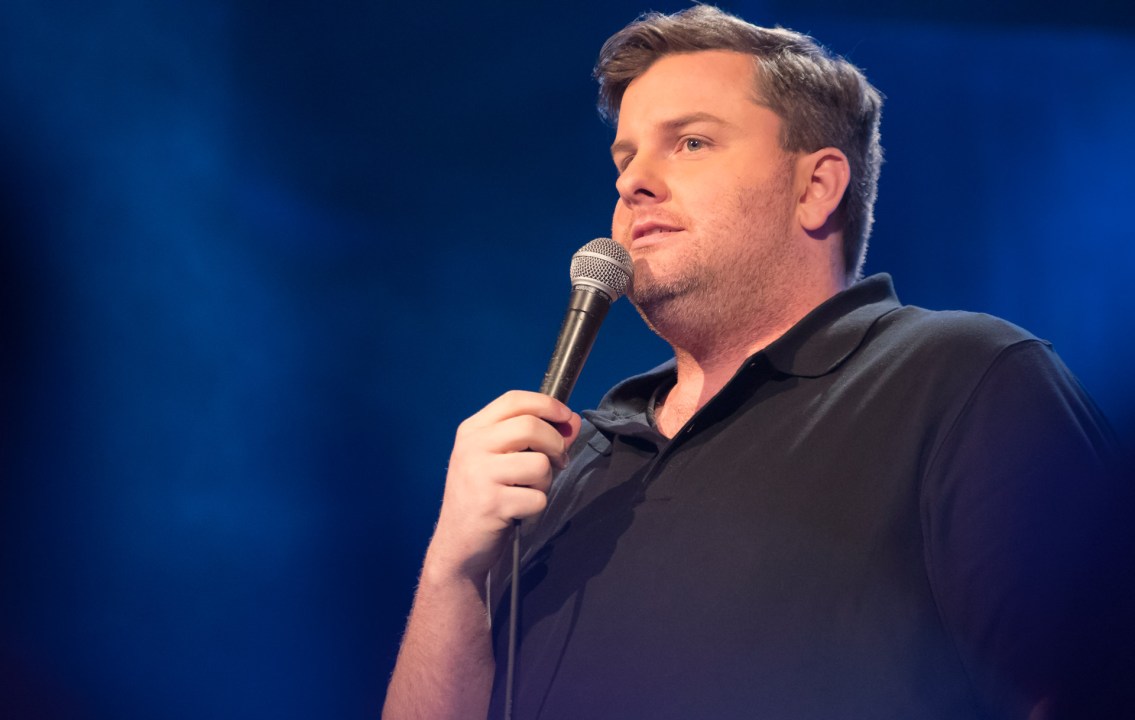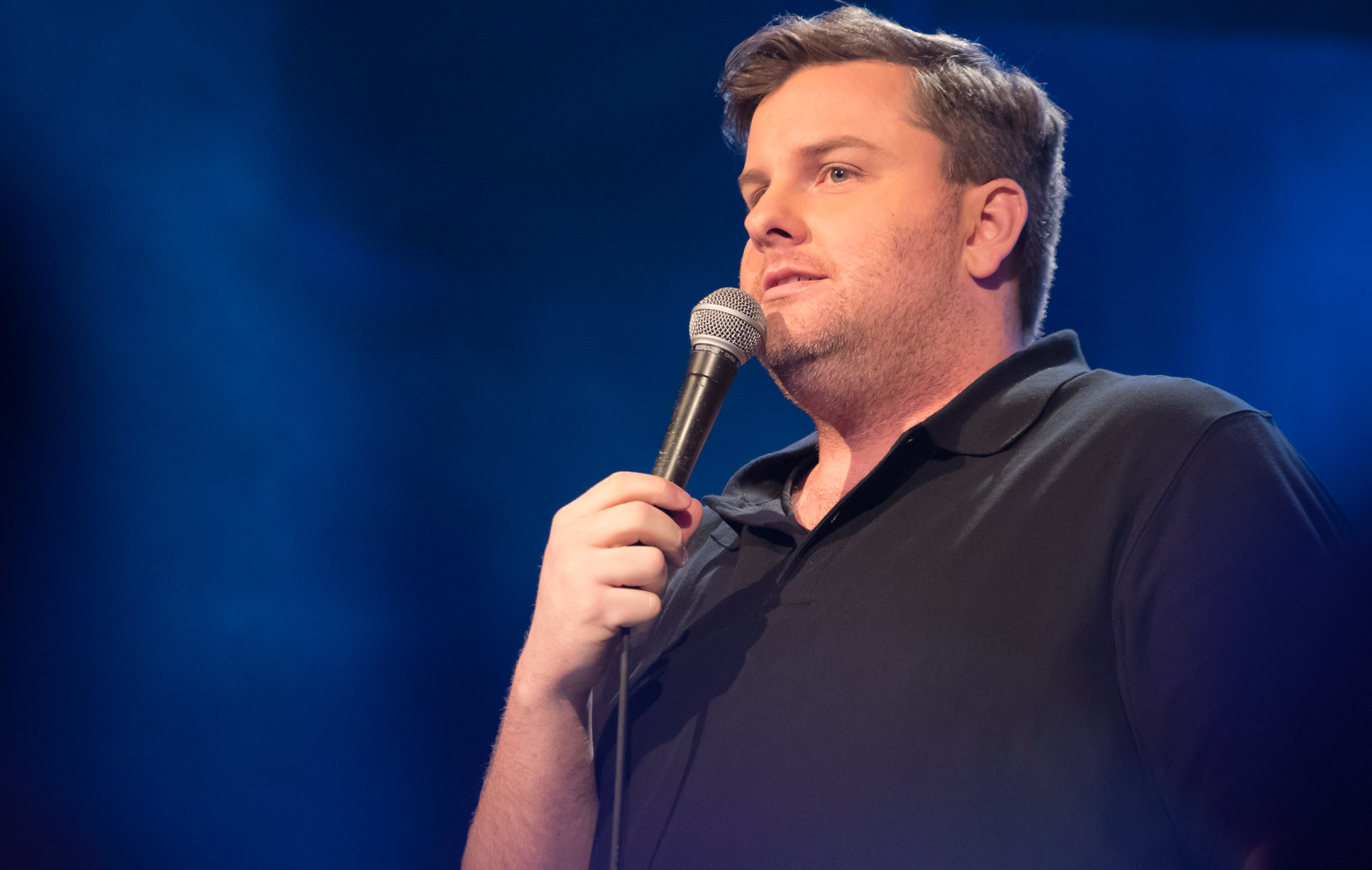Tim Dillon is a comedian who not so long ago worked as a New York tour bus guide and subprime mortgage salesman. He started a podcast from his porch in 2016 and used it to talk about world events, what he and his lowlife friends were up to, and, frequently, to complain about how broke he was.
‘I understand fighting in Ukraine is tough. But have you ever defended Vladimir Putin at a dinner party in Malibu?’
Today, each episode of The Tim Dillon Show is downloaded more than a million times and subscriptions generate income in excess of $175,000 a month. In early April, he will perform at the Royal Albert Hall. He’s also considering a run for governor of California.
Dillon’s gift is for articulating the increasing madness of the modern world, often from the perspective of the little guy being screwed by corporate overlords, and making it seem not only terrifying but also very funny. He finds plausible sounding conspiracy in almost everything and at every opportunity rails against elites – usually making pleasingly specific allegations. He styles himself as a ‘tour guide to the end of the world’ but regular listeners to his podcast understand his true sympathies lie with the men and women on the factory floor and in the office cubicle – people doing whatever it takes to get by. The comedy is dark, but almost always it is underpinned by genuine warmth.
He’s also a fan of people he deems to be rogues – Meghan Markle, for instance. ‘I like her now. I fully like her. As soon as she launched her lifestyle brand, I liked her because it all became apparent and obvious, and it became very funny. I would have lunch with her. I think she’s a great con artist and I respect the great con artists. She’s one of the greats – one of the great con artists of our time. To leave a country because you’re concerned about racism and because everyone’s being racist, and it’s not fair and there’s privilege, and then to come and live in the wealthiest town in another country, which is Montecito, Santa Barbara. To live in that town and then to launch a lifestyle brand called American Riviera Orchard is truly one of the funniest things I have ever seen. It’s absolutely hilarious. It’s a level of shamelessness to be commended. Meghan is a Hollywood actress. If you think the royal family is cold, if you think the royal family is calculating, you’ve never met a Hollywood actress.’
Three years ago, when I last interviewed him, Dillon told me the West was at ‘peak insanity’.‘I was wrong,’ he says now and laughs darkly. ‘I think people have a certain level of tolerance for existential dread. At a certain point, you know it’s being marketed to you. I mean the news is a product like anything else. I think people are getting deeply frustrated with the idea of purchasing their own existential dread. Or they’re at least recognising they’re doing it and making space in their life for more dread or more fear, and buying more anger.’
He says he now only consumes local news. ‘I find it much more interesting. I find national news is on a loop. It seems like the same show I’ve watched over and over… Putin: bad, Ukraine: good. That’s a tweet to me at this point.’ Does local news in America convey the same sense of national decline that we’re experiencing in Britain?
He says it does. ‘We see it in the infrastructure. It is really evident in the downtowns of many of our larger cities that we are a nation in decline. You won’t see a new building in many of our cities since the early 2000s. You’ll see architecture from the 1970s, the 1980s. Some of those cities are quite desolate, they’re quite abandoned.’
He adds that throughout the United States there are towns that have been effectively ruined by their failure to deal with serious social problems such as drug addiction and homelessness. ‘You get the feeling that these bustling, thriving centres of commerce have been handed over to people that are unwell mentally, are using drugs, do not have a place to live. Instead of giving those people help or getting them help, we seem to just give them large swathes of many of our major American cities.’
He tells me he’s just sold his house in California because he is worried for the future of the state – the result of what he terms ‘an epidemic of bad leadership.’ He points out how ridiculous it is to have tech companies in Silicon Valley worth a combined nine trillion dollars – ‘the largest consolidation of wealth in human history’ – but for large parts of nearby San Francisco to resemble something out of a zombie horror movie.
On his podcast he’s hinted that he might run for governor of California. Is that something he’s seriously contemplating? He says: ‘I do love the state and I hate to see what’s happening to it. I don’t think I would win. I think it’s very difficult to win. You could run as a Democrat with the blessing of all those tech people and all that money. But I do think – who knows? – maybe things will get bad enough… I’d run as an independent. I’d run as an independent because I think we need more people running as independents…
‘It is something that I do think about. It’s in the back recesses of my mind, because I do love the state. If I didn’t love the state, I wouldn’t care. But I think the state could be fixed. I think you just need to approach things rationally and overhaul some of these failed systems.’
Dillon says he is particularly saddened by the way American political discourse no longer seems concerned at all by the plight of children, or with building a better tomorrow on their behalf.
‘We’ve kind of given up on the children being the future – you don’t hear it anymore. No one talks about it. I think we’re really all in on AI and robots being the future. And we’ve kind of given up on these kids, and they’re running around being raised by algorithms and drugs. No politician will barely even mention it. When I grew up, it was all “the children! They will have great lives!” No one cares now. No one mentions it. It’s not a big deal.
‘We will not constrain these tech companies. We will not prevent Facebook and all these people from making a dollar. We would rather plunge an entire generation of children into madness rather than upset anybody’s profit in Silicon Valley. We know how detrimental [social media] is to people’s health.’
‘We would rather plunge an entire generation of children into madness rather than upset anybody’s profit in Silicon Valley’
Dillon says lately he’s been hanging out with independent presidential candidate Robert Kennedy Junior and advising him on how he might win the coming election. He tells me RFK’s son went to Ukraine to fight the Russians for four months. ‘God bless, respect. I know him. He’s a sweet kid. I think he did that for the right reasons. But I mean, when I met him for the first time and he was talking about the Ukraine, I said to him: “I understand fighting in Ukraine is tough. But have you ever defended Vladimir Putin at a dinner party in Malibu?” Because I have, and I think it’s as perilous, perhaps more.’
For what it’s worth, Dillon is opposed to America’s ongoing support for Ukraine on the basis he sees little merit in antagonising Russia. ‘I’m old enough to remember when it was told to me the Iraq war was necessary for my security. That Saddam Hussein was a Hitler who was going to invade everyone in the Middle East. It’s the same thing.
‘They don’t change the script – they always go back to the same script. It’s always someone that… the Bushes have eaten blue lobster rolls with. They then become a lunatic hell bent on destroying the world, we must stop them at all costs. It’s the same American playbook always…
‘We’ve had all the Navalny, Navalny, Navalny. What about Julian Assange? This painting of Russia as a crazy country that can’t be dealt with or negotiated with, that’s led by a psychotic leader that we need to depose. For who?’
Does this tour guide to the end of the world think we are nearly there? ‘The signs aren’t great,’ he says. ‘But I think that if there are positives, and we must look for positive signs, perhaps one of them is exhaustion. People are just getting too tired to fight with each other all the time and to misrepresent each other and to think the worst of each other. To assume that everyone who disagrees with them is their enemy. Because that is a lot of energy. There’s a lot of energy involved with being deeply suspicious and paranoid all the time. I’m hoping that if there’s anything that saves the current moment from spiralling into something much worse, it’s that people are just too tired to end the world.’








Comments